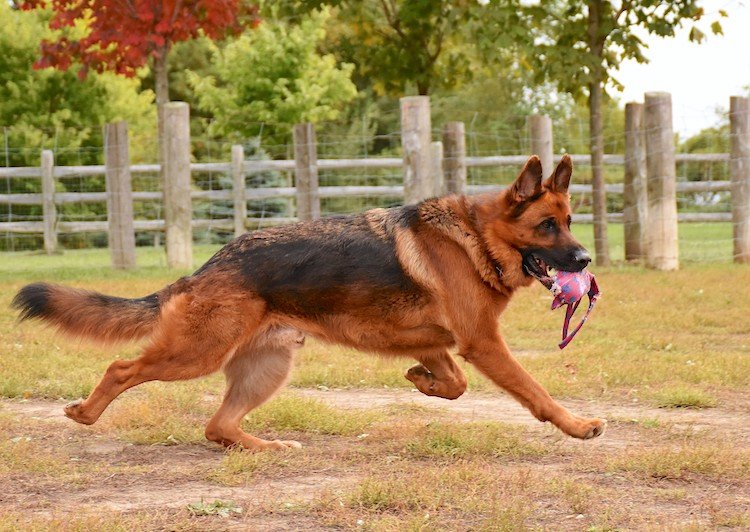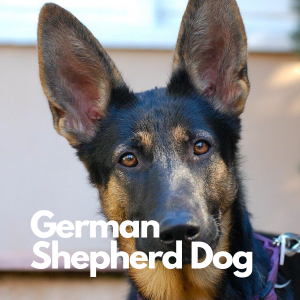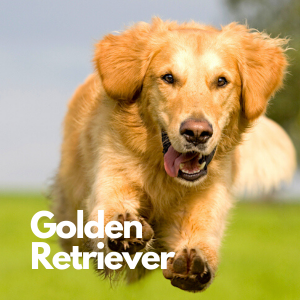

Herding

50-90 lbs.

22-26 in.

9-13 years
- Key Characteristics of German Shepherd Puppies
- Where German Shepherd Puppies Come From
- How Friendly Are German Shepherd Puppies?
- Is The German Shepherd The Right Dog for You?
- Caring for a German Shepherd Puppy
- Health and Wellness Tips for a German Shepherd Puppy
- How to Adopt German Shepherd Puppies
- References
Key Characteristics of German Shepherd Puppies
German Shepherd puppies, or GSDs, are among the most popular breeds in the United States.
- These medium-sized puppies are strong and muscular with dark, almond-shaped eyes and a bushy tail.
- The variable coat of German Shepherd puppies can be double, plush, or longhaired and comes in colors of black and tan, sable, black, blue, liver, and white.
Unique Traits of German Shepherd Puppies
German Shepherd puppies are known for their distinctive characteristics, which set them apart from other breeds.
- Loyalty and Courage: These puppies are fiercely loyal to their families and exhibit a courageous demeanor.
- Intelligence and Trainability: German Shepherd puppies are highly intelligent, making them easy to train and able to learn complex tasks quickly.
- Versatile Abilities: Their versatility allows them to excel in various roles, such as police work, service dogs, and search and rescue operations.
- Protective Nature: They have a strong protective instinct, making them excellent guard dogs.
- Physical Traits: German Shepherd puppies are strong and muscular, with a distinct appearance including erect ears and a bushy tail.
Where German Shepherd Puppies Come From
In 19th-century Germany, breeds of herding and farm dogs were crossed to create a new breed with a great work ethic and desirable companionship traits.
- The parent club was formed in 1899 after the breed was exhibited in 1882 in Hanover.
- The first German Shepherd Dog, named Horan, was registered in April 1889.
- The American Kennel Club (AKC) recognized the breed in 1908.
For more information about the most popular breeds, you can check out this article on dog breeds that have never won Best in Show at Westminster.

How Friendly Are German Shepherd Puppies?
erman Shepherd puppies are known for their ability to learn and retain training.
- Their even disposition — a combination of loyalty, courage, intelligence, fearlessness, and protective nature — comprises a range of qualities desired in a variety of fields.
- German Shepherd puppies have an excellent sense of smell and can be patient, observant, and decisive, qualities that make them superior service dogs.
As an energetic breed, German Shepherd puppies need an outlet for their energy, and firm and consistent positive reinforcement helps keep them focused. They can be wary and apprehensive of strangers, but once friendship is granted, it’s given for life.
- These puppies can experience separation anxiety, so don’t leave your German Shepherd puppy alone or crated for extended periods of time.
- If properly socialized, they’re good with other pets and children.
For more information on their intelligence, you can read about how many words a dog can understand, and for their excellent sense of smell, learn more about how dogs smell fear.
Is The German Shepherd The Right Dog for You?
Exercise Needs
HIGH: This active breed is looking for a job to do or a way to expel energy. Try daily walks, jogging and/or play to keep your GSD healthy and happy.
- Try daily walks, jogging, and play to keep your German Shepherd puppy healthy and happy.
- These puppies can do well in apartments as long as their exercise needs—a daily, consistent commitment—are met. Learn more about dogs that do well in apartments.
Grooming Needs
MEDIUM: In addition to trimming nails, cleaning ears and brushing the teeth, you should brush your GSD daily — these dogs are average shedders and shed more seasonally.
- These puppies are average shedders and shed more seasonally.
- Their skin irritates easily, so don’t bathe your German Shepherd puppy too frequently.
Health Problems
HIGH: Despite being a popular, active breed, the German Shepherd Dog has a substantial list of potential health problems, including:
- Bloat
- Hip dysplasia
- Elbow dysplasia
- Blood disorders
- Epilepsy
- Eczema
- Von Willebrand disease
- Perianal fistulas
- Keratitis (corneal inflammation)
- Flea allergies
- Tumors (spleen is common)
- Degenerative myelopathy
- Endocrine disorders
- Digestive problems caused by myasthenia gravis (and megaesophagus)
To better understand myasthenia gravis and megaesophagus, read this article from someone who managed the conditions in her GSD.
More Stats About German Shepherd Dogs
| Friendliness | ★★★★☆ |
| Ease of Training | ★★★★★ |
| Barking/Howling | ★★★★☆ |
| Shedding | ★★★★★ |
| Tolerate Being Alone | ★★☆☆☆ |
| Very Good With Kids | ★★★★☆ |
Caring for a German Shepherd Puppy
Caring for a German Shepherd puppy involves meeting their physical, mental, and emotional needs to ensure they grow into healthy and well-behaved adults.
- Exercise: German Shepherd puppies need plenty of physical activity. Daily walks, playtime, and mental stimulation are essential to keep them healthy and happy.
- Training and Socialization: Early training and socialization are crucial. Positive reinforcement methods work best for training these intelligent puppies.
- Grooming: Regular grooming, including brushing their coat, trimming nails, cleaning ears, and brushing teeth, is necessary to keep your German Shepherd puppy well-maintained.
- Diet and Nutrition: Provide a balanced diet suitable for puppies to support their growth and development. Consult with your vet to determine the best food for your German Shepherd puppy.
Learn more about German Shepherd Dogs in this video:
Health and Wellness Tips for a German Shepherd Puppy
Maintaining the health and wellness of your German Shepherd puppy involves regular veterinary care, a proper diet, and an active lifestyle.
- Regular Veterinary Checkups: Schedule regular vet visits to monitor your puppy’s health and catch any potential issues early.
- Vaccinations and Preventatives: Ensure your German Shepherd puppy is up-to-date on vaccinations and receives regular flea, tick, and heartworm preventatives.
- Balanced Diet: Feed your puppy a nutritious diet that supports their growth. Avoid overfeeding to prevent obesity.
- Mental Stimulation: Provide toys and activities that challenge your puppy’s mind to keep them mentally sharp and prevent boredom.
- Awareness of Health Issues: Be aware of common health problems in German Shepherds, such as hip dysplasia, elbow dysplasia, and digestive issues. Early detection and management are key to keeping your puppy healthy.
How to Adopt German Shepherd Puppies
You can often find German Shepherd puppies in shelters and rescues. Start with our free adoptable dog search.
- Shelters and Rescues: German Shepherd puppies are frequently available for adoption. It’s a great way to provide a home to a puppy in need.
- Breeders: If you end up looking for a breeder, ensure you ask for health records of the parents and be wary of the major red flags of a puppy mill. Considering the many possible health problems of German Shepherd puppies, please don’t skip this step.
References
- “German Shepherd Dog.” American Kennel Club. https://www.akc.org/dog-breeds/german-shepherd-dog/.
- German Shepherd Dog Club of America. https://gsdca.org/.
- “About the German Shepherd Dog.” German Shepherd Dog Club of Canada. https://www.gsdcc.ca/about-the-breed.
- “GSD Health Information.” GSDL of Great Britain. http://www.gsdleague.co.uk/gsd-health/4573433131.
- “German Shepherd Dog.” American Kennel Club. https://www.akc.org/dog-breeds/german-shepherd-dog/









